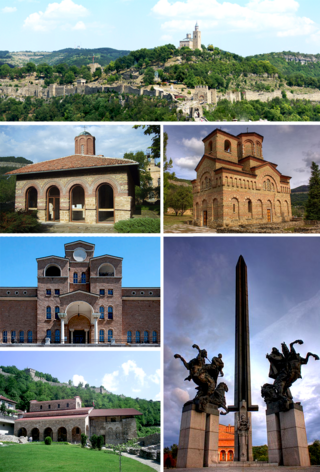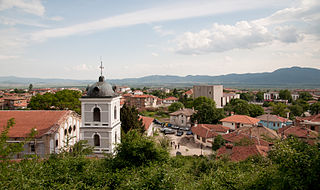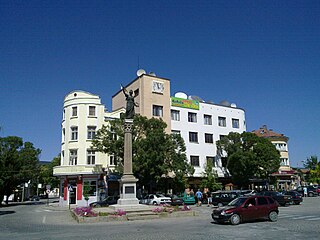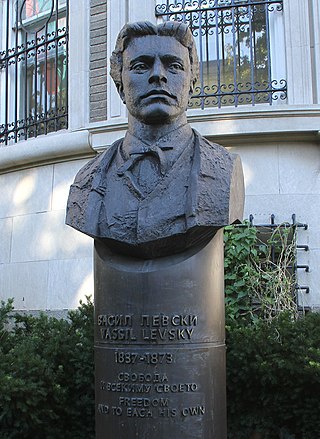
Veliko Tarnovo is a city in north central Bulgaria and the administrative centre of Veliko Tarnovo Province. It is the historical and cultural capital of Bulgaria.

Sopot is a Bulgarian town situated in the fertile sub-Balkan mountain valley of Karlovo, immediately below the steep southern slopes of the Troyan Balkan Mountain. Sopot is part of Plovdiv Province and is the administrative centre of a municipality with the same name.

Sevlievo is a town in north-central Bulgaria, part of Gabrovo Province. Sevlievo is known as one of the wealthiest towns in Bulgaria owing to the well developed local economy, high employment rate and major foreign investments, such as the Ideal Standard Companies factory. It is the administrative centre of the homonymous Sevlievo Municipality.

Dimitrovgrad is a town in Haskovo Province, Bulgaria. It is along the Maritsa River in the Thrace region, close to the provincial capital, Haskovo. Dimitrovgrad is the administrative centre of Dimitrovgrad Municipality.

Troyan is a town remembering the name of Roman Emperor Trajan, in Lovech Province in central Bulgaria. It is the administrative centre of the homonymous Troyan Municipality. The town is about 162 kilometres away from the country capital Sofia. The river of Beli Osam passes through the heart of the town. The 2021 Census indicates that the population of the Trojan was 18,449 inhabitants. The ethnic distribution of the inhabitants is ethnic Bulgarians (87.29%), with minorities being Roma (1.23%) and Turks (1.03%). Donka Mihaylova of Bulgarian Socialist Party has been the town's mayor since 2011.
Balgarovo is a small town in southeastern Bulgaria. It is located in Burgas Municipality and is close to the town of Kameno.

Karnobat is a town in the Burgas Province, Southeastern Bulgaria. It is the administrative centre of the homonymous Karnobat Municipality. According to the 2021 census, the town had a population of 16,483.

Lovech is a city in north-central Bulgaria. It is the administrative centre of the Lovech Province and of the subordinate Lovech Municipality. The city is located about 150 kilometres northeast from the capital city of Sofia. Near Lovech are the towns of Pleven, Troyan and Teteven.

Karlovo is a historically important town in central Bulgaria located in a fertile valley along the river Stryama at the southern foot of the Balkan Mountains. It is administratively part of Plovdiv Province and has a population of about 19,373, the mayor being Dr. Emil Kabaivanov.

Velingrad is a town in Pazardzhik Province, Southern Bulgaria, located at the western end of Chepino Valley, part of the Rhodope Mountains. It is the administrative center of the homonymous Velingrad Municipality and one of the most popular Bulgarian balneological resorts. The town has a population of 22,602 inhabitants according to the 2011 census of Velingrad.

Teteven is a town on the banks of the Vit, at the foot of the Balkan mountains in north central Bulgaria. It is the administrative centre of the Teteven Municipality which is a part of Lovech Province. As of December 2010, the town had a population of 10,733.

Levski is a town in central northern Bulgaria, an administrative center of the homonymous Levski Municipality in the very southeast of Pleven Province.
100 Tourist Sites of Bulgaria is a Bulgarian national movement established in 1966 to promote tourism among Bulgaria's most significant cultural, historic, and natural landmarks.

Pavel Banya is a small town in Stara Zagora Province, South-central Bulgaria, located between the towns of Kalofer and Kazanlak. It is the administrative centre of the homonymous Pavel Banya Municipality. As of December 2009, the town had a population of 2,918. The place is famous for its mineral springs.

Štalkovica is a village in the municipality of Probištip, North Macedonia. It used to be part of the former municipality of Zletovo.

Mijaks are an ethnographic group of Macedonians who live in the Lower Reka region which is also known as Mijačija, along the Radika river, in western North Macedonia, numbering 30,000–60,000 people. The Mijaks practise predominantly animal husbandry, and are known for their ecclesiastical architecture, woodworking, iconography, and other rich traditions, as well as their characteristic Galičnik dialect of Macedonian. The main settlement of the Mijaks is Galičnik.
Izvor is a village in Burgas Municipality, in Burgas Province, in southeastern Bulgaria. It is known for the long stay of Bulgarian revolutionary Vasil Levski during the preparation of an uprising against the Ottoman Empire.

A bust of Vasil Levski is installed outside the Embassy of Bulgaria, near Sheridan Circle, along Embassy Row and in the Kalorama Heights neighborhood of Washington, D.C., United States.
The Aytoska reka is a 32.5 km long river in eastern Bulgaria that flows into Lake Burgas, which drains into the Black Sea.

„Vihar“ Football Club is a bulgarian football club based inAytos. The club was established in 1921 and plays in the "A" Regional Group Burgas.




















